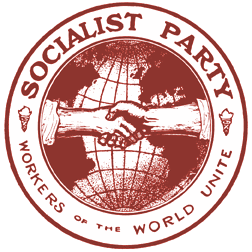The Supreme Court decision in Pierce v. United States, 252 U.S. 239 (1920), upheld the convictions of four socialists under the Espionage Act of 1917. Pierce, the last ruling regarding the criminal sections of the Espionage Act, represented another setback for civil liberties in the World War I era.
Socialists arrested for distributing pamphlet
On August 26, 1917, police in Albany, New York, arrested four socialists following their distribution of a four-page pamphlet entitled “The Price We Pay.” Written by Episcopal clergyman Irwin St. John Tucker, it argued that the war was the price paid for rejecting socialism and asserted that capitalists were responsible for U.S. entry into war. At a meeting of the Albany branch of the Socialist Party on July 11, 1917, members had initially voted not to circulate the pamphlet pending a decision by the U.S. district court in Maryland. When that court upheld the legality of the pamphlet, members distributed 7,000 copies over five weeks before their arrest.
Supreme Court upheld conviction
The Supreme Court heard oral argument on November 18 and 19, 1919, and ruled on March 8, 1920. Six of the Court’s members joined Justice Mahlon Pitney’s majority opinion, in which he condemned the “highly colored and sensational document.” The case turned on the jury’s authority to determine the danger posed by wartime speech. “What interpretations ought to be placed upon the pamphlet,” wrote Pitney, were “for the jury, not the court, to decide.” Pitney also insisted that “common knowledge” and President Woodrow Wilson’s statement justifying U.S. entry into war sufficed as evidence of the war’s meaning; thus, the pamphlet’s assertions of capitalist conspiracy were willfully “false statements” meant to hinder the war effort.
Dissenters rejected falsity of pamphlet
Justice Louis D. Brandeis dissented, joined by Justice Oliver Wendell Holmes Jr. Brandeis rejected the falsity of the pamphlet, insisting that it presented “opinion and judgment, not matters of fact.” Brandeis also thought the idea of allowing juries to distinguish interpretations from facts would “deny members of small political parties freedom of criticism and discussion,” particularly in wartime, “when feelings run high and the questions involved are deemed fundamental.”
This article was originally published in 2009. Christopher Capozzola is Professor of History at the Massachusetts Institute of Technology. He is the author of Uncle Sam Wants You: World War I and the Making of the Modern American Citizen (2008).

